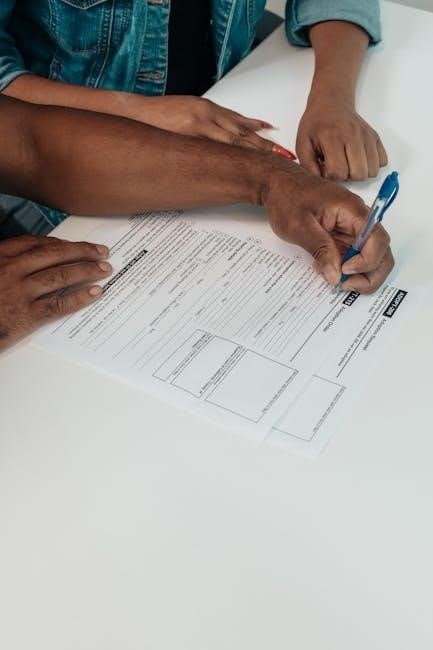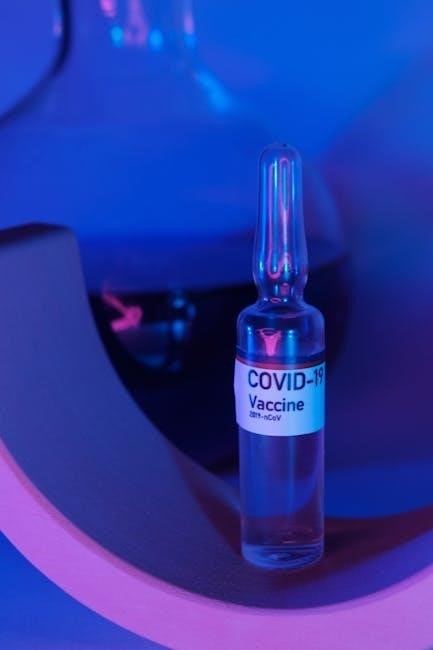A drug test consent form is a document ensuring individuals agree to undergo drug or alcohol testing, often required by employers to maintain workplace safety and compliance.
1.1 Purpose and Importance of Drug Test Consent Forms
Drug test consent forms serve as a legal safeguard, ensuring employers comply with workplace policies while respecting employee rights. Their primary purpose is to obtain voluntary, informed agreement for drug or alcohol testing, crucial for maintaining a safe and productive work environment. These forms also protect employers from potential legal disputes by demonstrating clear communication of testing procedures and consequences. By outlining the purpose, process, and implications, consent forms foster transparency and trust between employers and employees, addressing privacy concerns and promoting a substance-free workplace culture.
Legal Requirements for Drug Testing Consent
Understanding legal frameworks is crucial for ensuring drug testing compliance. Workplace substance abuse laws and employer obligations vary, requiring clear policies and employee consent to avoid disputes.
2.1 Overview of Workplace Drug Testing Laws
Workplace drug testing laws vary by jurisdiction but often require employers to balance safety, productivity, and employee rights. The Drug-Free Workplace Act of 1988 mandates federal contractors and grant recipients to maintain drug-free environments. State laws differ, with some allowing broad testing while others restrict it to specific industries or situations. Employers must adhere to these regulations when implementing drug testing programs, ensuring compliance and obtaining necessary consents to avoid legal disputes. These laws aim to prevent substance abuse while protecting individual privacy and rights.
2.2 Employee Rights and Privacy Concerns
Employee rights and privacy are critical considerations in drug testing. While employers aim to maintain a safe and productive workplace, employees have the right to privacy and protection from unwarranted intrusion. Drug testing policies must ensure that procedures are fair, non-discriminatory, and respectful of personal boundaries. Consent forms play a key role in balancing these interests by clearly outlining the scope and purpose of testing. Employers must comply with legal standards to avoid violating privacy laws and to foster trust and cooperation among employees.

Employer Policies and Drug Testing Programs
Employers implement drug testing programs to ensure workplace safety and productivity. These policies often include pre-employment, random, or post-incident testing, requiring documented consent from employees or applicants.
3.1 Types of Drug Tests Commonly Administered
Common drug tests include urine, saliva, blood, and hair follicle tests. Urine tests are widely used for pre-employment screening due to their cost-effectiveness and ability to detect recent drug use.
Saliva tests are non-invasive and ideal for on-site testing, detecting substances consumed within the past 24-48 hours.
Blood tests provide precise results but are invasive, typically used in high-risk industries.
Hair follicle tests detect long-term drug use, offering insights into substance abuse patterns over months.
Each method has unique advantages and is selected based on specific testing needs and employer policies.
3.2 Consequences of Failing a Drug Test
Failing a drug test can lead to severe consequences, including termination of employment, particularly in safety-sensitive roles or industries with strict drug policies.
Mandatory counseling or rehabilitation programs may be required as part of corrective action plans.
In some cases, a failed test can result in loss of benefits or future job opportunities.
For pre-employment screenings, it may lead to withdrawal of the job offer.
Repeated offenses often result in more stringent penalties, potentially impacting career advancement.
Employers may also impose probationary periods to monitor compliance with drug-free workplace policies.
Understanding these consequences is crucial for maintaining workplace trust and adherence to company standards.

The Drug Test Consent Form in Detail

A drug test consent form outlines the purpose, procedure, and confidentiality measures, ensuring participants understand and agree to the testing process.
4.1 Key Components of a Consent Form
A drug test consent form must include clear details about the purpose of the test, the substances being screened, and the testing procedure. It should outline confidentiality measures and how results will be handled. The form must also state that participation is voluntary and inform individuals of their rights. Legal compliance and employer policies should be referenced to ensure transparency. Additionally, the form should provide space for the individual’s signature and date, confirming their understanding and agreement to the terms outlined.
4.2 How to Complete a Drug Test Consent Form
To complete a drug test consent form, carefully review the document to ensure understanding of its terms. Provide accurate personal information and acknowledge the testing conditions. Sign and date the form to confirm voluntary consent. If unsure about any aspect, seek clarification before signing. Ensure the form complies with legal standards and retain a copy for personal records. Submit the completed form to the designated authority as instructed; This process ensures transparency and mutual agreement between the individual and the requesting party.
Special Considerations and Scenarios

Drug test consent forms are crucial in sensitive industries, high-risk jobs, and pre-employment screenings to ensure safety and compliance while respecting individual rights.
5.1 Drug Testing in Sensitive or High-Risk Industries

Drug testing is often mandatory in industries like transportation, healthcare, and aviation, where public safety is paramount. Employers in these sectors use consent forms to ensure compliance with strict regulations. For instance, the Drug-Free Workplace Act requires federal contractors to maintain drug-free environments. High-risk jobs, such as operating heavy machinery, also necessitate regular testing to prevent accidents. These industries prioritize safety, making drug test consent forms a critical tool for minimizing risks and ensuring a drug-free workplace.
5.2 Drug Testing for Pre-Employment Screening
Pre-employment drug testing is a common practice to ensure candidates are fit for roles requiring safety and productivity. Employers use consent forms to legally conduct these tests, often before extending job offers. This practice helps maintain a drug-free workplace, reduces risks, and ensures compliance with industry regulations. Candidates must provide informed consent, allowing employers to screen for substances that could impair job performance. This step is particularly crucial in high-risk industries, where public safety and operational integrity are paramount.

Ethical and Privacy Issues
Drug testing raises ethical concerns, including privacy rights and informed consent. Ensuring confidentiality of results is crucial to protect individuals’ dignity and legal rights.
6.1 Ensuring Informed and Voluntary Consent
Ensuring informed and voluntary consent is critical in drug testing. Individuals must fully understand the purpose, procedures, and implications of the test. Consent forms should clearly outline their rights, including the right to refuse testing and the potential consequences of doing so. Voluntary participation is essential to avoid coercion, fostering trust between the tester and the individual. This ethical approach ensures transparency and respect for personal autonomy, aligning with legal and moral standards for drug testing practices.

6.2 Handling Confidentiality of Test Results
Confidentiality of drug test results is paramount to protect individuals’ privacy. Employers and testing entities must ensure that all data is securely stored and accessed only by authorized personnel. Consent forms should specify how results will be used and shared. Breaching confidentiality can lead to legal consequences and erosion of trust. Proper protocols, such as encrypted systems and limited access, must be implemented to safeguard sensitive information, ensuring compliance with privacy laws and ethical standards in handling drug test results.

Templates and Examples
Drug test consent form templates are readily available online, allowing employers to easily create customized forms. These templates ensure compliance with legal standards and simplify the consent process.
7.1 Where to Find Reliable Drug Test Consent Form Templates
Reliable drug test consent form templates can be found on official employer websites, legal document platforms, or HR resource sites. Websites like LawDepot, LegalZoom, and employer-specific portals offer downloadable templates that comply with local laws. Additionally, HR departments often provide standardized forms tailored to workplace policies. Online marketplaces such as Template.net also offer customizable templates for drug testing consent forms, ensuring they meet specific organizational needs while maintaining professionalism and legal standards.
7.2 Customizing the Form for Specific Needs
Customizing a drug test consent form ensures it aligns with your organization’s policies and legal requirements. Start with a reliable template and tailor it to include specific clauses, such as the types of drugs being tested, testing methods, and consequences of refusal or positive results. For sensitive industries, additional sections on confidentiality or high-risk scenarios may be necessary. Always consult legal experts to ensure compliance with local laws and to protect both employer and employee rights. This step guarantees the form is both enforceable and fair.
A drug test consent form is essential for maintaining a safe, compliant workplace while respecting individual rights and ensuring fair, ethical testing practices.
8.1 Final Thoughts on the Importance of Proper Consent
Proper consent is essential for ethical, legal, and practical reasons, ensuring individuals understand and agree to drug testing. It balances employer needs with employee rights, fostering trust and transparency. Clear communication and documentation prevent misunderstandings, while respecting privacy and confidentiality. Non-compliance can lead to legal issues, undermining workplace integrity. Prioritizing informed consent protects both parties and upholds ethical standards. Regularly updating policies ensures alignment with evolving laws and standards, maintaining fairness and accountability in drug testing processes.
